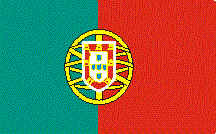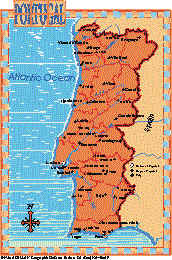


Portugal is the westernmost country of continental Europe. The smallest country lies on the Iberian Peninsula. Spain-Portugal's neighbor to the east and north-covers most of the peninsula. Most Portuguese live in rural villages. Fish and wine from Portugal are enjoyed by people in many parts of the world.
Government
Portugal is a republic. Its Constitution, adopted in 1976, grants the people such rights as freedom of speech, religion, and the press. Portuguese citizens 18 years or older may vote in elections.
Politics
Portugal 's largest political organizations are the Social Democratic Party Center, the Portuguese Socialist Party, and the Party of Democratic Renewal.
Population and ancestry:
Portugal has a population of about 10 million people. About 2/3 of the country's people live in rural areas. Lisbon is Portugal's largest city. It has a population of about 818,000 and a metropolitan area population of more than 2,000,000. Lisbon is also the country's economic, political, and cultural center, and it has one of the world's finest harbors.
Way of life
Most rural Portuguese live in small fish or farm villages. Fishing villages line the country's east. Although Portugal remains a rural country, its cities-especially Lisbon and Porto-are growing rapidly. Each year, a large number of the nation's rural people move to urban areas to find jobs in industry or other city activities. The Portuguese maintain close family ties. Often, two or more generations of a family live together in the same house.
Religion
Portuguese who practice a religion are Roman Catholics. The country also has small groups of Jews, Muslims, and Protestants.
Education
Portugal's education system is weak compared to those of most other Western European nations. Many adults cannot read or write. Many children leave school before the age 16. In most cases, they come from poor families and leave school to begin work. Elementary school is available throughout Portugal, but many parts of the country have no high schools. Portugal has 10 universities, four of which named after the 1974 revolution. The largest one is Lisbon University. Less than 2% of the people attend the university.
Facts in Brief
Capital: Lisbon
Official language: Portuguese
Population: estimated 1996- 9,894,000; estimated 2001- 9,945,000
Chief products: agriculture- grapes, tomatoes, hogs, chickens, milk, beef cattle, corn; fishing- sardines;
National Anthem: " A Portuguesa" ("The Portuguese")
Money: escudo
My experience:
While in Europe, I was fortunate to be able to visit Lisbon, Portugal. We drove with some friends of the family through many cities to get there. It was a nice adventure that allowed us to see many historical monuments and places.